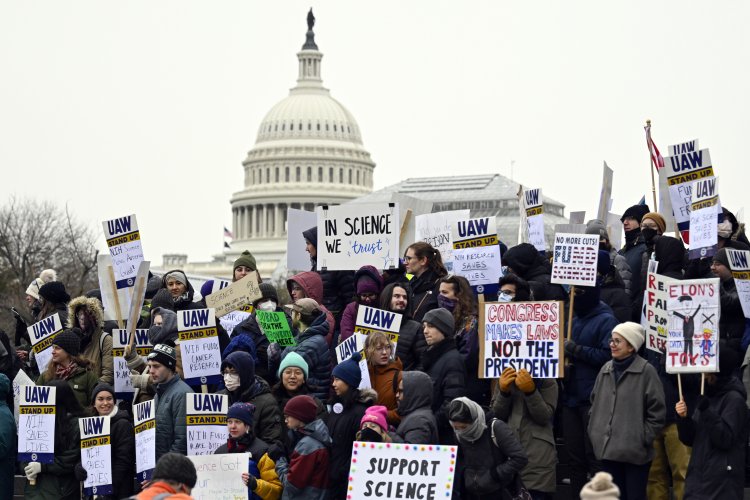California Democrat Suggests Establishing State's Own NIH in Response to Anticipated Trump Reductions
The ambitious state lawmaker contends that actions taken by Elon Musk and Robert F. Kennedy Jr. indicate it's time for the Golden State to "step up" as a global leader.

Introduced in the California Senate on Thursday, the bill aims to set up a new state agency to fund scientific research that has been compromised by cuts from Elon Musk's Department of Government Efficiency. It also seeks to enhance vaccine accessibility, an issue brought into question by Health and Human Services Secretary Robert F. Kennedy Jr.
"California is a global leader on science in our own right, and we must step in to protect our scientific institutions from the new Administration’s anti-science, Make America Sick Again onslaught," said the bill's author, San Francisco state Sen. Scott Wiener, in a statement announcing the proposal. “For California to thrive, we must defend science,” Wiener emphasized.
This initiative comes at a time when California, along with other states, braces for significant reductions in healthcare and scientific research funding from Washington. This concern is further heightened by a rising measles outbreak, which has raised doubts about the administration's stance on vaccinations.
President Donald Trump has already attempted to cut $4 billion from NIH research grants, a move currently stalled in court. At the same time, Kennedy's promotion of supplements like cod liver oil and vague vaccination guidance amid a deadly measles outbreak in Texas has raised alarms among public health officials.
Wiener’s bill mirrors actions taken by California during the initial Trump presidency, when Gov. Gavin Newsom sought to independently assess Covid-19 vaccines due to public distrust in federal policies.
"As Trump, Musk, and RFK Jr. tear apart federal science leadership, California must step up for science," Wiener remarked, suggesting he has his sights set on Nancy Pelosi's House seat. “California must lead.”
With his proposed legislation, California could address both the loss of federal funding and vaccine access issues. The initiative would establish the California Institute for Scientific Research, which would offer grants and loans in areas targeted for budget cuts by Trump and Musk, including biomedicine, climate change, and drug safety research.
Moreover, it would empower California's existing prescription drug manufacturing and procurement initiative, CalRX, to enhance vaccine access.
Local public health departments already procure thousands of vaccine doses annually through a centralized system called myCAvax, while millions of dollars are allocated for research in the state's public colleges and universities.
However, much of the research in California relies on federal funding, and Wiener’s bill proposes to mitigate the impact of potential budget cuts with grants directed at California-based companies, schools, and nonprofits, as well as out-of-state researchers collaborating with California scientists.
Should federal support for vaccine production decline, the bill compels CalRX to seek contracts with manufacturers to produce its own vaccines, similar to its current initiatives for naloxone access in the fight against opioid overdoses.
During the last Trump administration, Newsom created his own scientific advisory committee alongside other Democratic governors in Western states—such as Colorado, Oregon, Nevada, and Washington—tasked with reviewing the safety and effectiveness of Covid-19 vaccines, as well as assessing vaccine recommendations and stay-at-home orders independently from Trump-led mandates.
While the bill is anticipated to encounter resistance from the state’s Republican minority, its most significant challenge may arise when the proposal's financial implications are assessed, especially as the state grapples with proposed budget reductions and a shortfall in its Medicaid program.
Emily Johnson for TROIB News
Discover more Science and Technology news updates in TROIB Sci-Tech












